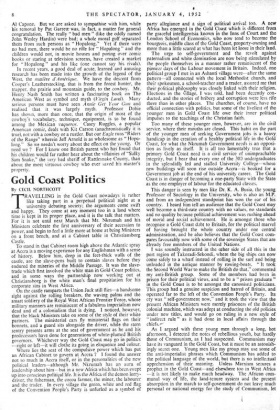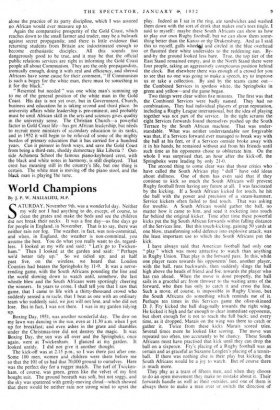Gold Coast Politics
By CECIL NOWITICOTT
TRAVELLING in the Gold Coast nowadays is rather like taking part in a perpetual political night at a university debating society; the arguments come swift and happy. They come at any moment too in a land where time is kept in its proper place, and it is the talk that matters. For it is not until next March that Mr. Nkrumah and his Ministers celebrate the first anniversary of their accession to power, and begin to feel a little more at home at being Ministers on a front bench, and at a Cabinet table in Christiansborg Castle.
To stand in that Cabinet room high above the Atlantic spray at Accra is a moving experience for any Englishman with a sense of history. Below him, deep in the feet-thick walls of the castle, are the slave-pens built to contain slaves before they endured the miseries of the Middle Passage. It was the slave- trade which first involved the white man in Gold Coast politics, and in some ways the partnership now working out at Christiansborg is the white man's final propitiation for his corporate sins in West Africa. On the castle ramparts the Union Jack still flies—a handsome sight against the rolling breakers, the waving palms and the smart soldiery of the Royal West African Frontier Force, whose military manners are reminiscent of a fabulous imperialism now dead and of a colonialism that is dying. I noticed, however, that the black Ministers take on some of the style of their white partners. The ministerial cars fly ministerial flags on their bonnets, and a guard sits alongside the driver, while the stern sentry presents arms at the seat of government as he and his predecessors have done for generations of white-plumed British governors. Whichever way the Gold Coast may go in politics —right or left—it will clothe its going in eloquence and colour. Where lies the seat of the compulsive power which has put an African Cabinet to govern at Accra 7 I found the answer not so much in Accra itself, or in the personalities of the new political leaders—although Mr. Nkrumah has an aura of leadership about him—but in a new Africa which has been swept up into conscious political life. It is the Africa of the demon lorry- driver, the fisherman, the cocoa farmer, the miner, the labourer and the trader. In every village the green, white and red flag of the Convention People's Party is unfurled as a symbol of party allegiance and a sign of political arrival too. A new Africa has emerged in the Gold Coast which is different from the graceful intelligentsia known in the Inns of Court and the London School of Economics, who now tend to become the bourgeois, middle class of the Gold Coast, property-owning and more than a little scared at what has been let loose in their land.
The urge to self-government and the revolt against paternalism and white domination are now being stimulated by the people themselves in a manner rather reminiscent of the pi,coneer days of the Labour movement in Britain. Indeed, one political group I met in an Ashanti village were—after the same pattern—all connected with the local Methodist church, and their spokesmen, a school-teacher and a trader, assured me that their political philosophy was closely linked with their religion. Elections in the village, I was told, had been decently con- ducted, and the stories of bribery and corruption were less rife there than in other places. The churches, of course, have no official connection with politics, but some of the liveliest of the younger men in Gold Coast life owe their inner political impulses to the teachings of the Christian faith.
Too many of these younger men, however, are in the civil service, where their mouths are closed. This habit on the part of the younger men of seeking Government jobs is a heavy, handicap in the creation of a healthy political life in the Gold Coast, for what the Nkrumah Government needs is an opposi- tion as lively as itself. It is all too lamentably true that a primary Gold Coast need is a civil service of unimpeachable integrity, but I hear that every one of the 303 undergraduates in the splendidly led and staffed University College—whose new buildings will soon rise outside Accra—is booked for a Government job at the end of his university career. The Gold Coast is in danger of becoming a one-party State with the State as the one employer of labour for the educated classes.
This danger is seen by men like Dr. K. A. Busia, the young Professor of Sociology in the University, who is also an M.P. and from an independent standpoint has won the ear of his country. I heard him tell an audience that the Gold Coast may well become a third-rate country with no values, no standards and no quality because political achievement was rushing ahead of moral and social achievement. He is amongst those who recognise a Gold Coast debt to Britain, for the political marvel of having brought the whole country under one central administration, and he also believes that the Gold Coast com- pares favourably now with some of the sovereign States that are already free members of the United Nations.
I was soundly instructed in the Qther side of all this in the port region of Takoradi-Sekondi, where the big ships can now- come safely to a wharf instead of rolling in the surf and being unloaded in the antique manner by rowing-boats. " It took the Second World War to make the British do that," commented my anti-British group. Some of the members had been in prison for their political views, and to be a " prison graduate " in the Gold Coast is to be amongst the canonised politicians. This group had a genuine suspicion and hatred of Britain, and operated far to the left of the Convention People's Party. Its cry was " self-government now," and it took the view that the present African Ministers were merely prisoners of the .British colonial machine, which was adept at conducting the old policies under new titles, and would go on ruling in a new style of " indirect rule " as it had done in local affairs through the As I argued with these young men through a long, hot afternoon, I detected the notes of rebellious youth, but hardly those of Communism, as I had suspected. Communism may have its vanguard in the Gold Coast, but it must be an astonish- ingly secret one. Young men like my group may use some of the anti-imperialist phrases which Communism has added to the political language of the world, but there is no intellectual apprehension of their meaning. Unless Marxism secures a prophet in the Gold Coast—and elsewhere too in West Africa —it is not likely to make much headway. The African com- munal way of life, the land-tenure system and the present absorption in the march to self-government do not leave much personal or national energy for the study of Communism, let
alone the practice of its party discipline, which I was assured no African would ever measure up to. Again the comparative prosperity of the Gold Coast, which reaches down to the small farmer and trader, may be a bulwark against secret propaganda; and there is little evidence that returning students from Britain are indoctrinated enough to become enthusiastic disciples. All this sounds too dangerously good to be true, and it may be that the official public relations services are right in informing the Gold Coast people all about Communism. They are the only propagandists, ironically enough, doing it with zeal and efficiency, and shrewd Africans have some cause for their comment, " If Communism is such a bogey for the. white man, there must be something in it for the black."
" Resented but needed " was one white man's summing up to me of the general position of the white man in the Gold Coast. His day is not yet over, but in Government, Church, business and education he is taking second and third place. In university affairs white leadership is pre-eminent, and probably must be until African skill in the arts and sciences gives quality in the university sense. The Christian Church—a powerful factor in Gold Coast life—has got African leadership, but n&ds to recruit more ministers of secondary education to its ranks, and in 1952 it will begin to be relieved of some of the mighty burden of primary education that it has carried for a hundred years. Can it pioneer in fresh ways, and save the Gold Coast from being a third-rate, shoddy democracy like Liberia ? Out- side Achimota School the famous piano-keyboard crest, with the black and white notes in harmony, is still displayed. That crest has meaning still in the country's life, but one thing is certain. The white man is moving off the piano stool, and the black man is, playing The tune.







































 Previous page
Previous page